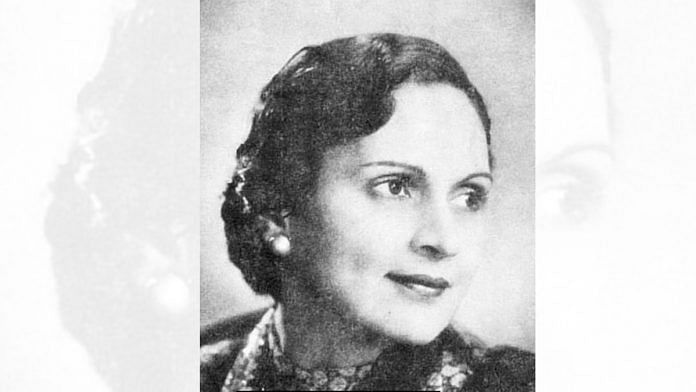New Delhi: “I have a wish, that everybody — young and old, women and men, girls and boys — give dignity to labour. Irrespective of what the job is. Even if one is sweeping the floor, do it so well that people ask who cleaned the floor,” said Durga Khote in an interview just a year short of her death in 1990.
In a red sari, with short hair and dentures sticking out, Khote, at the age of 85, was regarded as a pioneering actor in Hindi and Marathi cinema. In 2000, she was named by India Today in its millennium issue as one of the ‘100 People Who Shaped India’. She was known as someone who marked a defining phase in Indian cinema as she entered the film industry to support her children after the passing of her husband, breaking the notion that people from respectable families don’t work in the show business.
On her 29th death anniversary, ThePrint rewinds to the life and times of the pre-independence era actor who became known for playing mother to the stars.
How Vita Laud became Durga Khote
Durga Khote was born as Vita Laud to an elite Maharashtrian family in the Bombay Presidency on 14 January 1905. Because she came from a well-established family, she was allowed to complete her education. She went to Cathedral High School and then to St Xaviers College to do her Bachelor in Arts. It was at that time that her marriage was arranged with mechanical engineer Vishwanath Khote from Banaras Hindu University.
They had two sons, but shortly after, her husband died. Widowed at the age of 26, she did not want to be dependent on her in-laws (whom she lived with). So, to provide for her family, she started working in films. The first opportunity came when her sister Shalini, who was a friend of producer J.B.H. Wadia, convinced her to appear in his silent film Farebi Jaal (1931). The movie did poorly and she received much backlash. A large part of it was also because the public could not reconcile to the idea of woman whose family was the crème de la crème of society acting in movies.
Also read: Forever the thespian, Jennifer Kendal gave Indian theatre a lasting legacy
The mother and more
Khote got her her big break when well-known director V. Shantaram spotted her and cast her in his bilingual movie Ayodhya Ka Raja in 1932. Khote managed to impress audiences and from there on, she didn’t look back.
Talking about the man who gave her big break, she said: “Shantaram Sir taught me everything.”
She acted in movies such as Sairandhri (1933), Amar Jyoti (1936), Mahatma Vidur (1943) and Veer Kunal (1945). However it was in Mughal-E-Azam (1960), in the role of Jodhabai, that she finally entered a bigger league.
In an interview with actor Tabassum, when asked why she was typecast as the mother even early on in her career, Khote replied in an absolutely ungrudging manner that it was mainly because of her height and perceived personality that she was seen as a mother, especially in mythological movies and period dramas.
One of the most notable roles she played as a mother was in the movie Karz. Director Subhash Ghai said in an interview that Karz was a story where the role of a mother was very important.
“I needed someone to play the role who would look like a queen but would also have to work like a servant. She needed to look majestic and dignified and still like a queen, while doing the work of a maid-servant,” he said. “Durgaji knew how to carry herself and was extremely hardworking.”
Beyond Bollywood
Apart from movies, Khote was also a member of the Indian People’s Theatre Association (IPTA), where she worked alongside luminaries like Balraj Sahni, Prithviraj Kapoor and K.A. Abbas. She acted in the Marathi version of Macbeth, called Rajmukut, in which she played the role of Lady Macbeth.
Shashi Kapoor once said of her: “The most noteworthy thing about her was her professionalism and her desire to always be working on something which interested and moreover something which, according to her, was worthwhile. She never worked only for money.”
Refusing to be restricted to only films and theatre, she also set up one of the first ad agencies in the country, Durga Khote Productions, in the early 1940s. The company produced the Doordarshan soap, Wagle ki Duniya.
She was awarded the Padma Shri in 1968 and the Dadasaheb Phalke Award in 1984.
Durga Khote passed away on 22 September 1991, at the age of 86. The year before, she said in an interview: “I have a great desire to work and do something, I have a mission. I just don’t have the power or strength anymore though.”
Also read: Hemant Kumar, singer with Midas touch, who refused Padma Shri and Padma Bhushan




Very wrong to say, she entered big league after Mughal—E—Azam. You donot even mention Prithivivallabh with Sohrab Modi, who was her leading actor. His rendition of dialogues is much more superior to constipated voice of Prithviraj Kapoor.
One of India’s greatest actors and an inspirational figure.
Brave person. A star in her own way, and always a treat to watch.